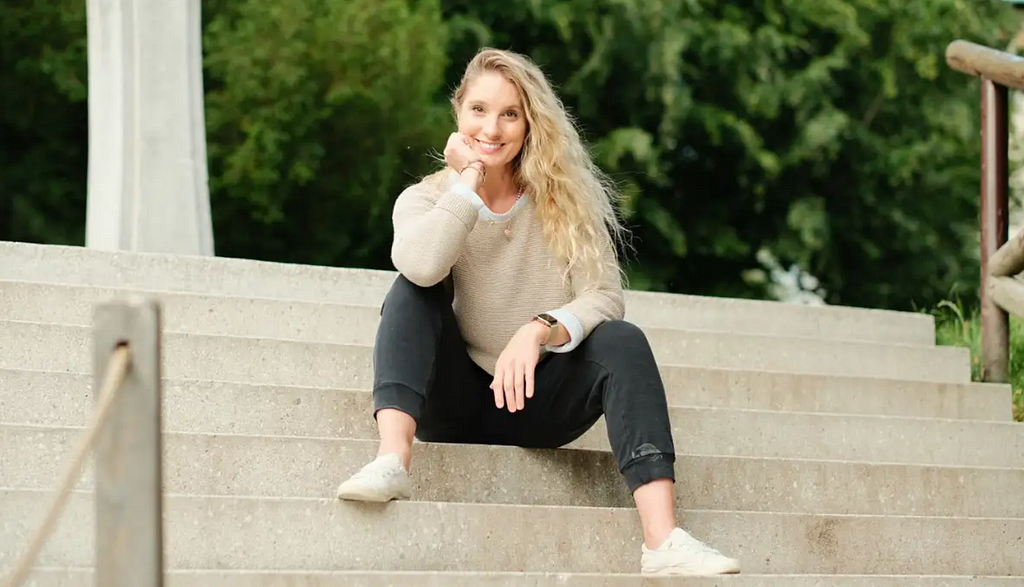Emily Kenison of RobeCurls: Why We Need More Women Founders & Here Is What We Are Doing To Make That Happen

Increase access to capital specifically for women entrepreneurs to address the funding gap and provide more equal opportunities for startup success.
As a part of our series about “Why We Need More Women Founders”, I had the pleasure of interviewing Emily Kenison.
Emily Kenison is a lawyer turned inventor and CEO of Emikeni that has led to award-winning product innovation that redefines women-led inventions. Kenison is the founder of Straplets, RobeCurls, and holds 12 patents, 9 trademarks, and over 100 copyrights that support her continued ambition to inspire the future of women entrepreneurship. Driven by sustainable design and the love of people, her companies are members of WBENC, 1% for the Planet, and Climate Neutral Certified.
Thank you so much for doing this with us! Before we dig in, our readers would like to get to know you a bit more. Can you tell us a bit about your “backstory”? What led you to this particular career path?
As a first-generation Turkish-American, I was expected to to pursue a career as a lawyer or a doctor, which I dutifully followed their advice and became a practicing attorney for six years. During my first week at my law firm job, I tripped into my first entrepreneurial idea of Straplets, a shoe accessory that instantly transformed high heels into stylish and comfortable shoes. For four years, I worked between balancing my work as a lawyer and building my business until the day I felt comfortable enough to leave my work and pursue my entrepreneurial dreams full-time. What I didn’t see coming was the pandemic, which stopped the production of Straplets and sales. Despite this setback, I was inspired by a viral TikTok trend of women trying to curl their hair with a bathrobe belt. With only $500 and a dream, I created RobeCurls, the first heatless curling headband. With my knowledge of patent law, I was able to secure my idea and was the first to market in 2020. Only 1% of patents are owned by women, and I am on a mission to inspire more women to bring their ideas to market, because one simple idea can make a world of difference. It’s why I became an inventor!
Can you share the most interesting story that happened to you since you began your career?
When I launched RobeCurls, the most interesting story that happened to me was seeing a stranger wearing my heatless curling headband out in public. It was a surreal moment. It felt like all those evenings and late nights spent on the floor of my living room trying to perfect the design had come full circle to see someone now using my invention as part of their daily routine. It showed me the real impact of how bringing an idea to life can make someone’s life better.
Can you share a story about the funniest mistake you made when you were first starting? Can you tell us what lesson you learned from that?
Before I decided on the name RobeCurls, I was iterating and testing the curling headband on the market under the brand name CurlScarf. My brother used to joke that it sounded like CurlBarf. Unfortunately for me, this became a reality. I made a typo on one of the packaging’s production runs and CurlScarf became CurlBarf! Once I saw it, I couldn’t unsee it. It was a mistake that reminded me that proofreading is important.
None of us are able to achieve success without some help along the way. Is there a particular person who you are grateful towards who helped get you to where you are? Can you share a story about that?
I am incredibly grateful to my mentor Sara Blakely, the inventive mind behind Spanx, who believed in me when RobeCurls was just a sketch on paper. She offered not just guidance throughout the product development stage, but also the confidence boost I needed to continue through the hardships of my first invention Straplets and persevere into my next invention RobeCurls. Her encouragement reminds me that behind every successful person is a village of supporters.
Is there a particular book that made a significant impact on you? Can you share a story or explain why it resonated with you so much?
“Let My People Go Surfing” by Yvon Chouinard significantly impacted me because it challenges the status quo of relentless consumerism that defines much of today’s capitalist society. Chouinard’s philosophy on responsible business practices and commitment to environmental sustainability deeply resonates with my approach to innovation. Unlike the common trend of brands releasing products for the sake of sales, often resulting in items that quickly become trash, this book resonates with our value to focus on creating products that are not only innovative but also durable and meaningful. It aligns with our commitment to ensure that what we create at RobeCurls doesn’t end up as waste but rather serves a purpose and stands the test of time, contributing positively to the environment and our lives.
Do you have a favorite “Life Lesson Quote”? Do you have a story about how that was relevant in your life or your work?
“Be the change you wish to see in the world.” This mantra not only has shaped my approach to sustainable and ethical innovation, but also how we build relationships at RobeCurls. It reminds us daily that true success comes from creating a company that genuinely cares for our customers. Through initiatives like CurlTalks, where we offer free one-on-one virtual curl classes to all customers, we not only ensure that our customers love the product but also seize every opportunity to form meaningful bonds. This practice of connecting and engaging directly has been instrumental in fostering a community where feedback is treasured, and each customer feels valued, embodying the change we aim to see in the world.
How have you used your success to make the world a better place?
Curling irons were invented over a century ago, rollers have been stagnant since the 80s, and we were long overdue for innovation. I created a new category in hair care that has empowered women with a tool that enhances their beauty without compromise. This success is measured by the freedom and empowerment that my customers feel, not just by the products that are sold.
Ok, thank you for that. Let’s now jump to the primary focus of our interview. According to this EY report, only about 20 percent of funded companies have women founders. This reflects great historical progress, but it also shows that more work still has to be done to empower women to create companies. In your opinion and experience what is currently holding back women from founding companies?
From what I’ve seen, funding stands as the primary obstacle for women founders. This challenge isn’t just financial; it’s symbolic of the broader hurdles women face in being taken seriously in the entrepreneurial world. Overcoming this requires not just changes in how we allocate resources but also in our cultural perceptions of female entrepreneurship and the value of women-driven innovation.
Can you share with our readers what you are doing to help empower women to become founders?
I am empowering women to become founders by sharing my own experience in creating an invention, as well as educating about pathways to entrepreneurship and how to bootstrap a brand. I care about women founders receiving funding for their ideas and connecting important ideas to the right people for visibility and diversity in the market. As a part of WBENC and Dreamers & Doers, I am a part of the foundation alongside other women founders to creatively look for opportunities that can elevate industries to be more receptive to women’s ideas that can benefit society and the environment as a whole.
This might be intuitive to you but I think it will be helpful to spell this out. Can you share a few reasons why more women should become founders?
Encouraging more women to become founders is crucial for driving innovation and fostering economic growth. Women’s unique life experiences and insights lead to the creation of groundbreaking products and services that fill the gaps in the market that others might overlook. As founders, women have the power to inspire change, create jobs, and lead companies that reflect the diversity and complexity of our society.

Can you please share 5 things that can be done or should be done to help empower more women to become founders?
1. Increase access to capital specifically for women entrepreneurs to address the funding gap and provide more equal opportunities for startup success.
2. Create mentorship and networking programs that connect aspiring female founders with seasoned entrepreneurs for guidance and support.
3. Enhance education and training focused on entrepreneurship for women, offering the tools and knowledge necessary to navigate the startup ecosystem.
4. Foster a culture of inclusivity within the investment community, encouraging more female investors and decision-makers.
5. Celebrate and amplify the success stories of women founders to inspire and motivate others, showing that it’s not only possible but achievable
You are a person of great influence. If you could inspire a movement that would bring the most amount of good for the greatest number of people, what would that be? You never know what your idea can trigger.
I’d champion a movement to support and amplify women inventors and to celebrate those who have poured their hearts and souls into creating products that not only succeed but spark change. By highlighting the profound impact of these original innovations, we can inspire a new generation of female creators to pursue their groundbreaking ideas.
We are very blessed that some very prominent names in Business, VC funding, Sports, and Entertainment read this column. Is there a person in the world, or in the US with whom you would love to have a private breakfast or lunch with, and why? He or she might just see this if we tag them.
I would be honored to have a private breakfast or lunch with Rich Gersten and Cristina Nuñez from True Beauty Ventures. (https://www.truebeautyventures.com/) Their dedication to supporting women founders and fostering innovation within the beauty industry resonates deeply with my own mission at RobeCurls. Their track record of empowering brands that are breaking the mold and setting new standards in beauty is not just impressive; it’s inspiring. A conversation with them would be an incredible opportunity to gain insights, share ideas, and explore potential collaborations that could further our shared goal of revolutionizing the beauty space with intention, innovation, and integrity.
How can our readers further follow your work online?
Readers can follow my work at www.emikeni.com and sign up for my newsletter where I share about my inventions and industry insights. Readers can also follow @emikeni on YouTube, LinkedIn, Instagram, Facebook, and TikTok.
Thank you for these fantastic insights. We greatly appreciate the time you spent on this.
Emily Kenison of RobeCurls: Why We Need More Women Founders & Here Is What We Are Doing To Make… was originally published in Authority Magazine on Medium, where people are continuing the conversation by highlighting and responding to this story.
